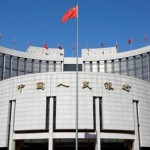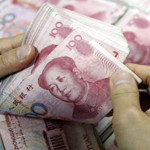Asia markets retrace some losses, China bucks trend

Major Asian stock markets retraced some of their downward slide but stayed in negative territory, following a massive sell-off on Wall Street overnight.
Japan’s Nikkei 225 retraced morning losses to trade down 2.86 percent, weighed by commodities and machinery sectors. Earlier, the benchmark fell as much as 4 percent.
South Korea’s Kospi traded down 0.97 percent.
Down Under, the ASX 200 closed down 78.04 points, or 1.56 percent, at 4,909.40, with energy and financials sectors sharply down. All sectors were in the red except gold producers, which saw an uptick of 3.61 percent.
After a late sell-off Wednesday afternoon, Chinese indexes opened lower. But in afternoon trade, the indexes turned positive, with theShanghai composite up 0.7 percent, while the Shenzhen compositetraded up 2.4 percent.
Hong Kong’s Hang Seng index was down 0.77 percent.
Offering some sign of stability in a generally volatile market, the People’s Bank of China (PBOC) set Thursday’s yuan mid-point rate at 6.5616, compared with Wednesday’s fix of 6.5630. The dollar-yuan pair was nearly flat at 6.5777.
Explosions rock central Jakarta
Explosions and gunfire in central Jakarta in the early afternoon local time sent Indonesia’s stocks tumbling. Reports said at least six explosions were heard. According to Indonesian police, three civilians and three police officers were killed in the blasts.
The Jakarta composite fell to a session low of 4,456.46 before regaining some ground to trade down 1.72 percent. The dollar-rupiahpair went up 0.87 percent at 13,940 on news of the explosions.
Bank Indonesia is expected to announce its monetary policy decision later today.
Japan core machinery orders decline
In Japan, core machinery orders in November fell 14.4 percent from the previous month, according to official data, down for the first time in three months. Orders, regarded as an indicator of capital spending,fell more than market expectations with a 7.9 percent decline.
Shares of Sumitomo were down as much as 6.63 percent after reports the company would record a 77 billion yen ($651 million) loss for the October-December quarter from a nickel project in Madagascar.
The dollar-yen pair traded 0.22 percent lower at 117.40. That likely weighed on Japanese exporters, which traded down between 3 and 5 percent.
Samsung Electronics reportedly said it would mass produce Qualcomm’s new Snapdragon 820 mobile processors, boosting its manufacturing business. Samsung shares were down 1.31 percent.
Oil prices at 12-year lows
In Asian trade, the globally traded oil benchmark, Brent crude, was down 0.86 percent at $30.05 a barrel, after finishing at $30.31 in U.S. trade, the first time since Dec. 30, 2015 it’s settled below U.S. crude’s level. U.S. crude futures, which briefly fell below the psychologically key $30 level overnight, tacked on gains of 0.26 percent to $30.56 a barrel.
While data showed U.S. crude inventories rose 234,000 barrels last week, less than expected, the numbers were overshadowed by a reportedly massive build-up in gasoline at 8.4 million barrels and over 6 million in distillates, which includes diesel and heating oil.
Lance Kawaguchi, managing director and global sector head for the resources and energy group at HSBC, said the pain from slumping oil prices was spreading to the broader energy sector.
“Crude oil prices at a 12-year low pile the pressure on energy-related companies to accelerate actions to cut costs and restructure,” he said.
“It intensifies the squeeze on working capital and makes effective cash management all the more important.”
Energy plays in Asia traded mostly lower, with Santos closing down 8.04 percent, Woodside Petroleum down 2.08 percent and Oil Searchdown1.27 percent at market close.
In Japan, Inpex was down 3.60 percent and Japan Petroleum was down 2.62 percent. South Korean oil plays were down between 0.37 and 2.73 percent. In the Chinese mainland, oil stocks were down, while Hong Kong-listed shares of CNOOC, PetroChina, and Sinopec were mixed, down 2.11 percent and up 0.22 percent respectively.
Japan’s biggest refiner JX Nippon Oil & Energy, the core business unit of JX Holdings, said it cut its crude oil refining plan for domestic use in January by 3.6 percent due to sluggish kerosene demand after a mild winter, Reuters reported. Shares of JX Holdings were down 2.73 percent.
Overnight on Wall Street
Major indexes in the U.S. were sharply in the red, with the S&P 500 slipping below the 1,900-point benchmark and officially entering correction territory, down 11.29 percent from its May 21, 2015, closing high of 2,130.82.
The S&P 500 shed 48.40 points, or 2.50 percent, to drop to 1,890.28 on Wednesday.
The Dow Jones industrial average closed down 364.81 points, or 2.21 percent, at 16,151.41, while the Nasdaq composite was down 159.85 points, or 3.41 percent, at 4,526.06.
On the data front, Australia released its December employment data. After adding an unexpected 71,000 jobs in November, the economy shed 1,000 jobs on-month, lower than market expectations. After the data, the Australian dollar popped up to as high as $0.6961, compared with around $0.6927 before the data, but the currency quickly retraced the gains to trade around $0.6928.
Elsewhere, the Bank of Korea kept its interest rates unchanged, in line with expectations. Indonesia’s central bank is also set to announce its monetary policy decision later in the day.
Source: CNBC – Asia markets retrace some losses, China bucks trend






























